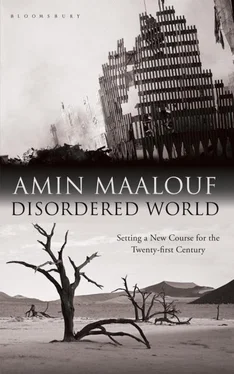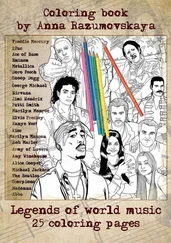I find the current opinion on the relationship between Islam and politics worrying because it constitutes the mental foundation of the ‘clash of civilisations’ which has made the world a violent place and threatens all our futures. From the point at which religion and politics in Islam are deemed to be indissolubly linked and it is accepted that this constitutes an immutable given written in the holy texts, the idea that this clash will never end — not in thirty years, nor in fifty, nor a hundred and fifty, nor a thousand — becomes established, as does the notion that we are in the presence of two distinct forms of humanity. This is an idea that I find demoralising, of course, and destructive, but above all simplistic, inexact and ill-considered.
When the acts of violence committed by the US military in Abu Ghraib were revealed, one of the published photos showed a naked detainee forced to walk on all fours with a rope around his neck, held on a leash by a triumphantly smiling female soldier. Invited to comment on a US television channel, a Middle East specialist explained to viewers that in order to understand the horror aroused by these images in the Muslim world, you had to know that in Islam the dog is considered an unclean animal.
I was speechless. Did that mean that if an Irish or Australian detainee had been forced onto all fours with a rope around his neck and made to walk naked in the corridors of the prison, he wouldn’t have had anything to object to as dogs are not considered unclean in Ireland or Australia?
What’s more, this opinion was expressed by a brave, honest academic who has constantly campaigned against the war in Iraq. In this interview, he was ingenuously trying to denounce the acts of violence committed by some of his compatriots. So what is at issue here is not his intention, but the way of thinking which he unconsciously transmitted and which consists in treating Islam as though it came from a different planet.
I do not doubt that there are important specific characteristics in the journey the Muslim world has taken, and especially in the relationship it has established between religion and politics. But they vary greatly from one country to another and from one era to another; they result from the complicated history of peoples rather than the application of a doctrine; and they are not always to be found where we expect them.
And so, contrary to appearances, one of the tragedies of the Muslim world, both in the past and today, is that politics has constantly impinged upon the religious domain — and not the other way round. From my point of view, this is due not to the content of the faith but to factors which could be termed institutional, and principally to the fact that Islam has not favoured the emergence of a centralised ‘church’. It strikes me that if an institution similar to the papacy had been able to prevail, things would probably have happened differently.
I suppose that no one would claim that the popes have historically been promoters of freedom of thought, social advancement or political rights. And yet they have been — indirectly and by reaction against them, but nevertheless in a powerful way. By being a counterweight to holders of temporal power, they constantly limited the arbitrary exercise of royal power and quashed imperial arrogance, and in so doing preserved a sort of breathing space. It was in the gaps between two forms of absolutism — papal and royal — that the embryonic modernity of the future slowly took shape, a modernity which would one day shake the thrones of Europe and the authority of sovereign popes.
Moreover, the Christian and Muslim worlds sometimes experienced comparable phenomena at the same moment. Just as there was a duality between emperors and popes, so too was there a duality between sultans and caliphs. In both cases, rulers with political authority and military power presented themselves as protectors of the faith, while pontiffs with spiritual authority tried hard to preserve their autonomy, their sphere of influence and the dignity of their office. In both cases, conflicts were frequent, and similar incidents occurred in Rome and Baghdad between the tenth and thirteenth centuries, when powerful monarchs feigned humble repentance at the feet of the man of God, but all the while were preparing revenge.
The difference is that Saint Peter’s successors managed to hold on to their throne while the Prophet’s did not. Confronted with the political and military power of the sultans, the caliphs faced one defeat after another, were stripped of their prerogatives and eventually lost all autonomy of action. One day in the sixteenth century, the Ottoman sultan quite simply appropriated the title of caliph, which he added to his other pompous titles and retained until Kemal Atatürk decided to separate the two roles again in November 1922. Sixteen months later, he abolished the institution of caliph with a stroke of his pen. The last caliph, Abdul Mejid, a talented painter who exhibited his work in various European capitals, died in exile in Paris in 1944.
Within Western Christianity, meanwhile, the popes remained powerful. In France, the fight to prevent the encroachment of religious authority in the political sphere was intense; until the early twentieth century, in fact, Rome condemned the very idea of the republic. Many Catholics viewed it as an impious regime, and when the opportunity presented itself in 1940, some of Marshal Pétain’s supporters were eager to do away with ‘the strumpet’.
In Islam, the problem was always the opposite: not the encroachment of religious authority on the political sphere, but the stifling of religious authority by political authority. And paradoxically, it is because of this, and because of the crushing predominance of the political, that religion spread through the body politic.
What ensured that the papacy endured — and what the caliphate so desperately lacked — was a church and a clergy.
Rome was always able to mobilise its tight network of bishops, priests and monks, which covered every kingdom and province right down to the very smallest hamlet on Christian soil. They formed a powerful force, albeit ‘soft power’, which no monarch could overlook. The ruling pontiff also had the power to excommunicate or to threaten to do so, which in the Middle Ages was a formidable instrument that made emperors tremble just as much as the simple faithful. Islam had none of these things — no church, no clergy and no threat of excommunication. From the start, Islam developed a great distrust of intermediaries, whether saints or confessors. Man is supposed to be in direct dialogue with his Creator, speak only to Him, and be judged by Him alone. Some historians have compared this attitude to Luther’s Reformation and there are certainly similarities. Logically, this stance should have encouraged the early emergence of lay societies in the Islamic world. But history never advances in a predictable direction. No one could have foreseen that the enormous power of the papacy would one day end with the reduction of the place of religion in Catholic societies, while the distinctly anti-clerical sensibility of Islam, by preventing the emergence of a strong ecclesiastical institution, would favour an explosion of religion within Muslim societies.
Confronted with sultans, viziers and military commanders, the caliphs found themselves utterly helpless. They were unable to maintain the religious counter-power which was so useful to popes. As a result, princes exercised arbitrary power without restraint. The relatively free space in which embryonic modernity could grow never existed, or certainly not for long enough to allow cities and citizens to flourish.
But the papacy did not limit its influence to that of a counterweight to secular power. As official guardian of orthodoxy, it contributed to maintaining the intellectual stability of Catholic societies and even their overall stability. The lack of a similar institution in the Muslim world was conspicuous every time it was necessary to confront a rebellion that claimed religious legitimacy.
Читать дальше












